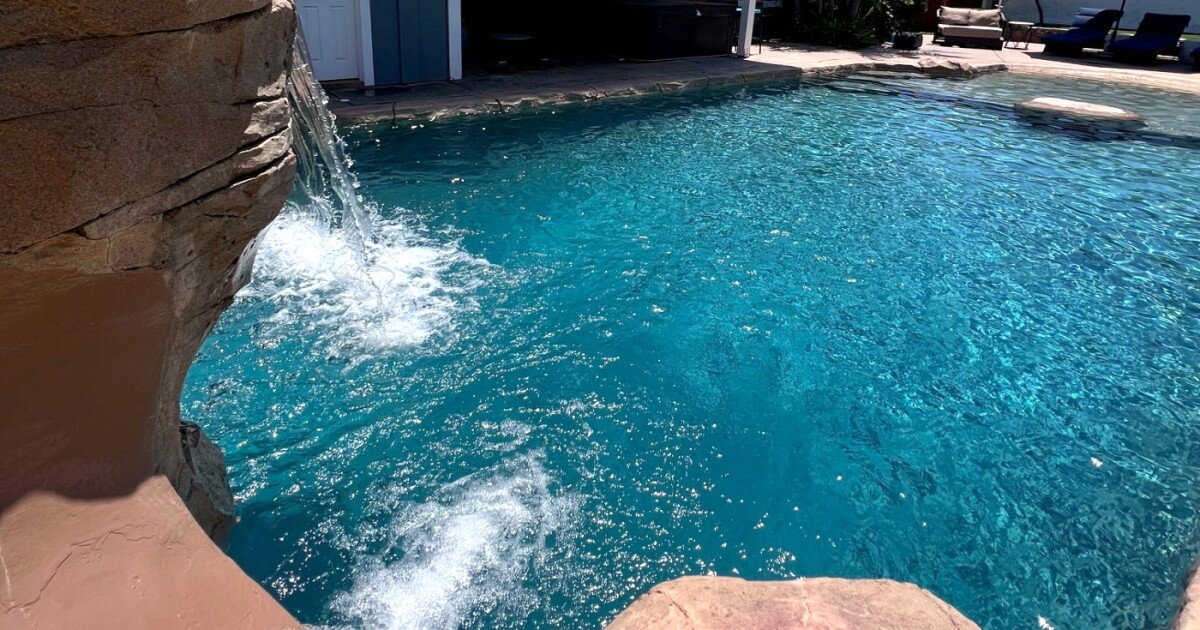This app gives sweltering San Diegans a private swim — and pool owners a side hustle
There’s a new solution in San Diego for those hot days when you’re frustrated that you don’t have access to a private pool: an AirBnB-style app called Swimply which lets people rent their backyard pools to strangers for around $50 an hour.
Newsletter
Get Pomerado News delivered to your inbox every week
Top titles from Poway, Rancho Bernardo and 4S Ranch, every Thursday for free.
You may occasionally receive promotional content from Pomerado News.
Fans of the platform, which launched nationwide in April, say it’s a lucrative side hustle for pool owners and a reasonably priced way for families who don’t have a swimming pool to enjoy a serene afternoon of swimming in someone else’s garden.
“I think a lot of people are trying it out because it’s something new and it seems like a cool concept,” said Becca Torres, who rents out the pool at her Point Loma home eight to 10 times a month. . “We have this big pool, we like to share it with people, and we can earn some money from it, so why not?”
Torres is among more than 125 pool owners in San Diego County who have already started advertising their pools on Swimply, accounting for 15% of each transaction. The company’s fee covers liability insurance to protect pool owners against injury, drowning and property damage.
The site lists pools for rent throughout the region, including Spring Valley, Lakeside, La Mesa, Alpine, Oceanside, Poway, and Bonita.
Hourly fees range from $25 to $150 depending on the amenities, with many pool owners charging extra if you have more than five people or want to use their hot tub and grill. For example, Torres charges $80 an hour, so a four-hour session with five people at his pool would cost $320 — plus $35 if you want to use the hot tub and $25 for the grill.
Fueled by millions in venture capital funding, Swimply has been growing rapidly since its soft launch here last year. After a more formal launch in April, the company began marketing and advertising more aggressively, including some billboards in San Diego. It is now present in 125 markets, including Canada.
An Oregon family said they made $177,000 by renting out their pool multiple times a day, but co-founder Bunim Laskin said this week that most attendees don’t become so aggressive.
Torres said his family earns around $3,000 a month. She and her husband’s decision to join Swimply wasn’t prompted by a financial crisis or fear that they wouldn’t be able to afford tuition when their kids were ready for college, she said. declared.
Rather, it was about wanting to let other people enjoy their elaborate pool, which is described as a “tropical Point Loma oasis with grotto and slide” on Swimply’s site.
“It was a really good experience,” she said. “The first families we had, I thought it could go either way because it was a bit awkward. But now it’s easy.
Their pool is located on a lower level of the property than the house, so it is more private for guests and the Torres family.
“It’s a little more manageable for us because it’s almost separate,” she said. “Honestly, we haven’t had a bad experience. We’ve had guests turn on the music a bit loudly, but at 4 p.m. it’s not the end of the world.
Like AirBnB, the Swimply site tries to weed out people who might cause trouble by allowing guests and hosts to review each other. The site also has a dedicated page for neighbors of pool owners where they can complain about noise, parking, and other issues.
Laskin said it’s inevitable that local governments will start regulating sites like Swimply, noting he’s had conversations with some community leaders before.
“I think it’s a super gray area, and everything gray people like to draw a color,” he said.
Laskin argues that Swimply fails to deliver some of the negatives that AirBnB critics focus on, such as competing with hotels or raising rents by taking accommodations off the market.
While Swimply brings more noise and potential parking issues to certain areas, Laskin estimated that 70% of its customers are families who don’t have access to a private pool — their own or a friend’s.
“We’re just doing a lot of good without breaking anything,” he said.
Laskin, 25, said the idea came to him four years ago at his New Jersey family home when a neighbor built a swimming pool and wouldn’t let Laskin’s family use it until which she agrees to pay 25% of the maintenance fee.
“When four other families also agreed to help, I realized that this thing that she feared was costing her money was actually making her money, and I thought that might be something” , did he declare.


Comments are closed.